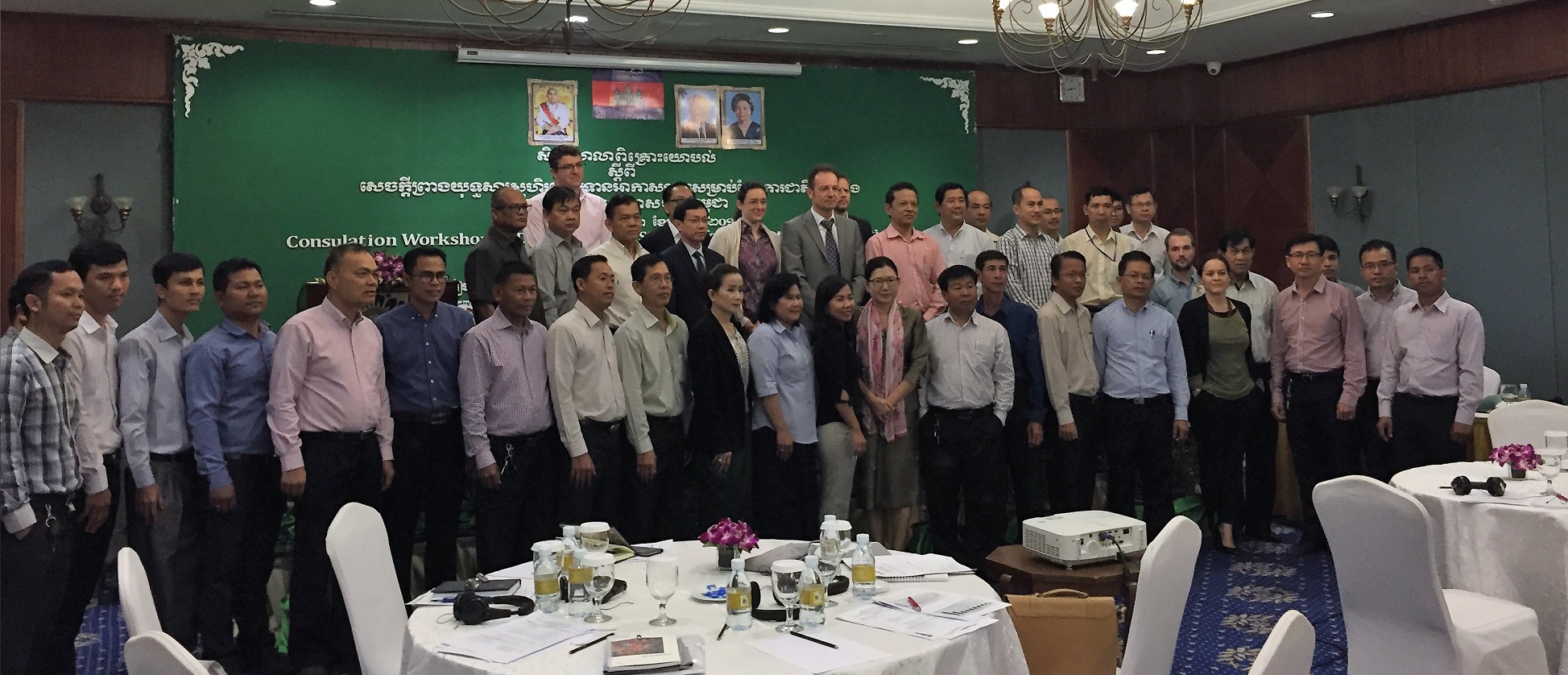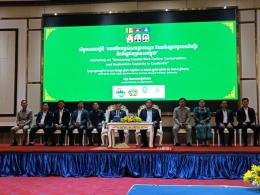 Phnom Penh, 23rd February 2017– The stakeholder consultation workshop on “Draft Financing Strategy for the National Adaptation Plan (NAP) of Cambodia” was organized byDepartment of Climate Change (DCC), General Secretariat of the NCSD and Ministry of Environment in cooperation with GIZ, and financed by the United States Agency for International Development (USAID) with participation of 44 representatives from 23 line ministries, agencies and development partners under chairmanship of H.E. Chuop Paris, Deputy Secretary General of NCSD and Mr. Thomas Waldraff, Country Director of Deutsche Gesellschaft für Internationale Zusammenarbeit (GIZ) Cambodia at Himawari Hotel. The event aims to present financial options, identify available financial resources from national and international levels in the context of climate finance readiness and particularly gather comments and feedback on the draft financing strategy, and develop an implementation plan for the identified priority actions for the NAP.
Phnom Penh, 23rd February 2017– The stakeholder consultation workshop on “Draft Financing Strategy for the National Adaptation Plan (NAP) of Cambodia” was organized byDepartment of Climate Change (DCC), General Secretariat of the NCSD and Ministry of Environment in cooperation with GIZ, and financed by the United States Agency for International Development (USAID) with participation of 44 representatives from 23 line ministries, agencies and development partners under chairmanship of H.E. Chuop Paris, Deputy Secretary General of NCSD and Mr. Thomas Waldraff, Country Director of Deutsche Gesellschaft für Internationale Zusammenarbeit (GIZ) Cambodia at Himawari Hotel. The event aims to present financial options, identify available financial resources from national and international levels in the context of climate finance readiness and particularly gather comments and feedback on the draft financing strategy, and develop an implementation plan for the identified priority actions for the NAP.
In the welcoming remarks, Mr. Thomas Waldraff, Country Director of GIZ Cambodia, underlined that GIZ appreciated the government’s past and current efforts in responding to climate change impact, particularly the financing of adaptation measures.
H.E. Chuop Paris, Deputy Secretary General of the NCSD expressed that the workshop reflected the efforts of Cambodia’s government in responding to climate change issues and the importance of mobilising resources for the implementation of priority actions of adaptation.
Sequent sessions of the consultations included three presentations: 1) the NAP process in Cambodia by Dr. Heng Chan Thoeun, Deputy Director of Department of Climate Change of General Secretariat of NCSD, 2). Progress of climate finance readiness programme by Mr. Erik Wallin, Advisor of GIZ, and 3) The draft financing strategy by climate finance expert team of GIZ. Following the presentations, group discussions were held on the 40 priority actions from the climate change actions plans (CCAPs) of line ministries and agencies. The 40 priority actions of adaptation were classified into five main clusters:
- Agriculture
- Infrastructure and Water resources
- Forestry, Fisheries and Livestock
- Cross cutting issues
- Disaster risk reduction, health, land use, housing and rubber
The discussion used eight key dimensions to get insights of the current status of each priority action and with the aim to develop an implementation plan. The eight key dimensions focused on:
- Targets specifying beneficiary groups and geographical areas;
- Type of intervention specifying hard and soft investment;
- Synergies and alignment to existing strategy and planning documents;
- Implementation partners including their experience in managing climate funds;
- Current stage of project development;
- Robustness of budget estimates;
- Time and sequencing; and
- Cross-cutting issues and linkages to other adaptation actions.
The discussions showed the complexity and the wide range of issues linked to the implementation of the CCAP priority actions and provided several useful insights which can be used in the further development of the Financing Strategy and Implementation Plan for the NAP.




